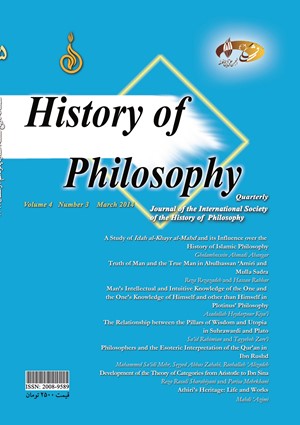Development of the Theory of Categories from Aristotle to Ibn Sina
Subject Areas : ریشهشناسی مکاتب و آراء فلسفی در ادوار قدیم و جدید
1 -
Keywords: Aristotelian logic Stoic logic Farabi Ibn Sina categories ,
Abstract :
Aristotle’s view of categories is not a merely linguistic one. His four-fold division of existents and referring to the features of being in the subject and being told in terms of the subject alongside each other indicate his ontological view of categories. In his eyes, they are the windows linking subject and object to each other. He poses the issue of categories to bring thought and reality together. Therefore, the goal of the laws of Aristotelian logic, in addition to analyzing the forms of thinking, is to explain the knowledge of reality as it is reflected in the human mind. The discussion of categories in Aristotle’s logical works functions as a window to the entrance of essentialism in logic and the dominance of Aristotelian metaphysics on his logic. This aspect weakens Aristotle’s logic in presenting and analyzing many propositions and syllogisms and makes the semantic aspect of this logic more prominent in comparison to its formal aspect. The theory of categories existed in logic books before Ibn Sina. In several cases in the book of categories of al-Shifa, he mentions that there is no place for the discussion of categories in logic and puts it aside in the logic section of al-Isharat. Unlike Aristotle, Ibn Sina’s heedlessness of categories can reveal formalization in logic and its deviation from Aristotle’s essentialism and semanticism.
ماكوولسكي، آ.، تاريخ منطق، ترجمة فريدون شايان، تهران، انتشارات مرزبان و پيشرو، 1364.
باجه، تعاليق ابن باجة علي منطق الفارابي، «كتاب المقولات»، بيروت، انتشارات دارالمشرق، 1994.م.
ابنسينا، الاشارات و التنبيهات، شرح خواجه نصيرالدين طوسي و المحاكمات قطبالدين رازي، ج1.
ابنسينا ، الشفاء(المنطق)، انتشارات مكتبةآية الله المرعشي، 1404.ق.
ابنسينا ، عيون الحكمة، بيروت، انتشارات دارالقلم، چ 2، 1980.م.
ارسطو، ارغنون، ترجمة شمس¬الدين اديب¬سلطاني، تهران، انتشارات موسسه¬ نگاه، 1378.
ارسطو ، متافيزيك، ترجمة شرف¬الدين خراساني¬(شرف)، تهران، انتشارات حكمت، چ 4، 1385.
فارابي، ابو نصر، احصاء العلوم، بيروت، انتشارات مكتبة الهلال، 1996.م.
الفارابي، ابو نصر، المنطقيات للفارابي، قم، مكتبة آية اللّه المرعشي، ج2، 1405ق.
ايزوتسو، توشيهيكو، محقق، مهدي، منطق و مباحث الفاظ(مجموعه متون و مقالات تحقيقي)، كتاب «الألفاظ» و كتاب «المقولات»، تهران، انتشارات دانشگاه تهران، 1353.
برن، ژان، فلسفه رواقي، ترجمه ابوالقاسم پورحسيني، تهران، موسسه انتشارات اميركبير، چ 2، 1362.
راس، ديويد، ارسطو، ترجمه¬ مهدي قوام صفري، انتشارات فكر روز، چ 1، 1377.
سجادي، سيدجعفر، فرهنگ اصطلاحات فلسفي ملاصدرا، تهران، انتشارات وزارت فرهنگ و ارشاد اسلامي، چ 2، 1386.
طوسي، محمد بن محمد، اساس الإقتباس، تصحيح مدرّس رضوي، تهران، انتشارات دانشگاه تهران، چ 4، 1367.
فرامرز قراملكي، احد، «الإشارات و التنبيهات سرآغاز منطق دو بخشي»، آيينة پژوهش، ش 22، 1378.
كاپلستون، فردريك چارلز، تاريخ فلسفه، يونان و روم، ترجمة جلالالدين مينوي، تهران، انتشارات علمي فرهنگي سروش، ج 1، 1380.
Bochenski, I.M., (1961), History of Formal Logic, Noterdam.
Kneal, William and Martha, (1962), The Development of Logic, Oxford.
Thomasson, Amie, Categories, The Stanford Encyclopedia of philosophy, first published, Jun, 3, 2004, Edition Fall 2013, Edward N.Zalta(ed).
Studtmann, Paul, Aristotle,s Categories, The Stanford Encyclopedia of philosophy, first published, sep, 7, 2007, edition Winter, 2013, Edward N.Zalta(ed).
Mates, Benson, 1973, Stoice Logic, California Library, reprint saries edition, printed in the United States of America.


